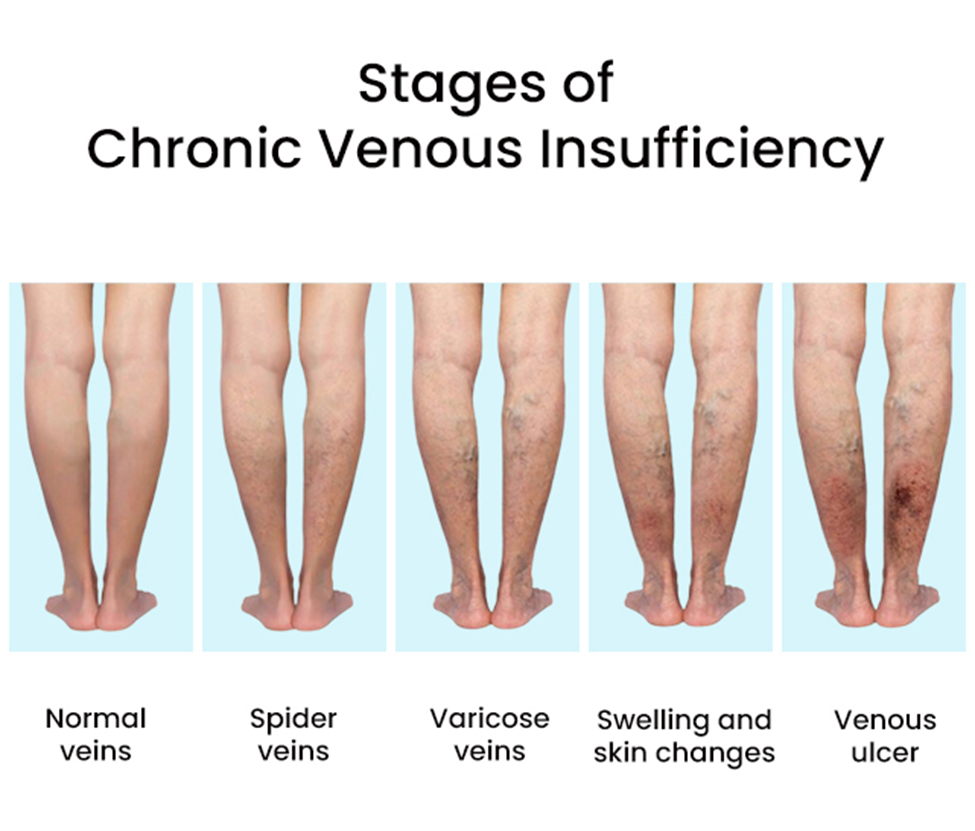Which of the following does the nurse recognize is common in peripheral venous insufficiency?
Intermittent claudication
Brownish discoloration to the legs
Weak or absent pedal pulses
Unequal peripheral pulses between extremities
The Correct Answer is B
A. Intermittent claudication:
Intermittent claudication is more commonly associated with peripheral arterial insufficiency rather than venous insufficiency. It is caused by inadequate blood flow to the muscles during activity, resulting in cramping or pain that typically resolves with rest.
B. Brownish discoloration to the legs:
Brownish discoloration to the legs, often referred to as hemosiderin staining, is a common finding in peripheral venous insufficiency. It occurs due to the breakdown of red blood cells and the deposition of hemosiderin in the tissues, especially around the ankles.
C. Weak or absent pedal pulses:
Weak or absent pedal pulses are more indicative of peripheral arterial insufficiency rather than venous insufficiency. Peripheral arterial disease can result in decreased blood flow to the extremities, leading to diminished pulses.
D. Unequal peripheral pulses between extremities:
Unequal peripheral pulses between extremities are also more suggestive of arterial insufficiency. Conditions such as atherosclerosis or arterial embolism can cause variations in pulses between different limbs.

Nursing Test Bank
Naxlex Comprehensive Predictor Exams
Related Questions
Correct Answer is C
Explanation
A. The patient pain reflects the target heart rate has been set too high and needs to be lowered to finish the test.
This option suggests that the chest pain is related to the target heart rate being set too high. However, chest pain during an exercise stress test is more commonly associated with myocardial ischemia rather than an inappropriate target heart rate. Lowering the target heart rate may not address the underlying issue of ischemia.
B. The patient’s pain reflects pericarditis and the test should be stopped.
Chest pain during an exercise stress test is more commonly associated with myocardial ischemia rather than pericarditis. Pericarditis is inflammation of the pericardium, and its symptoms may include chest pain that is often sharp and pleuritic. However, during an exercise stress test, the focus is on detecting cardiovascular abnormalities, and chest pain is more concerning for ischemia.
C. The patient’s pain reflects ischemia to the myocardium and the test should be stopped.
This is the most appropriate interpretation. Chest pain during an exercise stress test may indicate insufficient oxygen supply to the myocardium (ischemia). Stopping the test allows for further evaluation and appropriate intervention.
D. The patient’s pain reflects that supplemental oxygen is needed to finish the test.
Chest pain during an exercise stress test is not typically addressed by providing supplemental oxygen. Stopping the test and evaluating the cause of the chest pain is a more appropriate action.
Correct Answer is A
Explanation
A. Frequent change of position:
Frequent changes in position help prevent pooling of secretions and promote lung expansion. This simple and cost-effective measure is important in preventing complications related to immobility, such as pneumonia and atelectasis. It aids in maintaining optimal respiratory function.
B. Antibiotics: Antibiotics are used to treat bacterial infections and would not directly address the risks associated with decreased mobility.
C. Oxygen humidification: While oxygen therapy may be necessary in some cases, humidification is typically used to prevent drying of mucous membranes and is not a primary intervention for preventing complications of decreased mobility.
D. Chest physiotherapy: Chest physiotherapy involves techniques to mobilize respiratory secretions and may be indicated in specific situations. However, it is not as simple and cost-effective as frequent changes in position.
Whether you are a student looking to ace your exams or a practicing nurse seeking to enhance your expertise , our nursing education contents will empower you with the confidence and competence to make a difference in the lives of patients and become a respected leader in the healthcare field.
Visit Naxlex, invest in your future and unlock endless possibilities with our unparalleled nursing education contents today
Report Wrong Answer on the Current Question
Do you disagree with the answer? If yes, what is your expected answer? Explain.
Kindly be descriptive with the issue you are facing.
